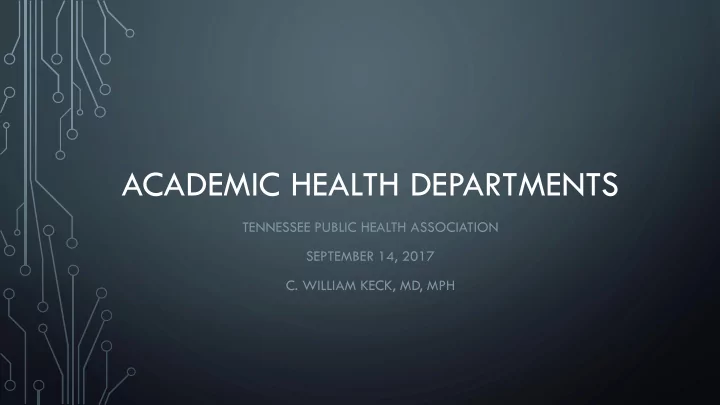

ACADEMIC HEALTH DEPARTMENTS TENNESSEE PUBLIC HEALTH ASSOCIATION SEPTEMBER 14, 2017 C. WILLIAM KECK, MD, MPH
PURPOSES FOR TODAY Define and describe the concept of an academic health department including benefits and risks. Identify the key elements associated with successful practice/academic partnerships. Assess the potential for developing an AHD in your environment.
DEFINITION A health department and academic institution affiliation. A collaborative relationship to enhance public health education and training, research and/or service. Expectation: Combining resources will broaden and enhance effectiveness of both the academic institution and the practice organization.
MORE SPECIFICALLY, WHY DO THIS? Better prepare students: Practice experience, Recruitment aid Get student and faculty help Gain access to academic resources Build and use practice-based evidence Help meet PHAB accreditation standards Quality improvement
WHAT ARE THE RISKS? Required time commitment Costs associated with housing and teaching students. Lack of complete buy-in from staff, leadership and board. Potential for failure if roles are not well understood. Risks and rewards not evenly shared
HOW DO AHDS START AND EVOLVE? • Student practicums workforce training by academics • Practitioners in the classroom faculty appointments for staff Public health education and training • Letters of support for research $$ collaborative funding proposals • Access to community data shared data collection Joint research • Practice based research networks (PBRNs) & analysis projects • Consultations collaborative community health assessments Shared public • Health care services and improvement plans health service provision
STAGED MODEL OF AHD DEVELOPMENT Stage 1: Informal Stage 3: Stage 5: Relationships Formal Written Comprehensive Agreement Collaboration Stage 2: More Stage 4: Established, Expansion Longer Term Relationships
• Limited engagement between organizations • Occasional teaching, internship placements • Relationship might be on and off Stage 1: Informal Relationships Stage 3: Formal Stage 5: Written Comprehensive Agreement Collaboration Stage 2: More Stage 4: Established, Expansion Longer Term Relationships
Stage 1: Informal Relationships Stage 5: Stage 3: Formal Comprehensive Written Agreement Collaboration Stage 4: Expansion Stage 2: More Established, Longer Term Relationships • More engagement between organizations • Recurring internships, teaching, research
• Formalizing partnership activities • What has been occurring • What want to occur • Engagement may be limited to a single area (education, research, or service) Stage 1: Informal Relationships Stage 5: Stage 3: Formal Comprehensive Written Agreement Collaboration Stage 2: More Stage 4: Expansion Established, Longer Term Relationships
Stage 1: Informal Relationships Stage 5: Stage 3: Formal Comprehensive Written Agreement Collaboration Stage 2: More Stage 4: Established, Longer Expansion Term Relationships • Expanding on existing elements of the partnership • Expanding into other areas (education, research, and service) • Partnership may be focused on all three areas
• Collaboration on all three areas (education, research, and service) • Shared personnel and resources Stage 1: Informal Relationships Stage 5: Comprehensive Stage 3: Formal Collaboration Written Agreement Stage 2: More Stage 4: Established, Expansion Longer Term Relationships
Stage 1: Informal Relationships Stage 5: Stage 3: Formal Comprehensive Written Agreement Collaboration Stage 2: More Stage 4: Expansion Established, Longer Term Relationships Bonus! • Bringing in additional organizations • Co-locating facilities
WHAT FORMS CAN AN AHD TAKE? Formal or informal Occasional students to residency programs and research collaborations. Volunteer to resource sharing One partnership or many
WHAT FACTORS SUPPORT DEVELOPMENT? Overlapping agendas Champions Buy-in of leadership and staff Ability to bridge the “cultural divide” Open and clear communication Patience Shared responsibilities , benefits and risks
ELEMENTS OF STRONG PARTNERSHIPS Shared vision Collaborative and effective education Shared personnel Shared resources and services Compensation for services provided Joint CHA and plan development Sensitivity to partner’s needs Trust established and maintained
QUESTIONS?
TENNESSEE HEALTH DEPARTMENTS 89 primarily rural county • Operating under the direct supervision of the TDH health departments 6 urban counties operate • Madison , Shelby, Knox, Davidson, Hamilton & Sullivan under local governance • Knox County & Department of Public Health at University of Tennessee at Knoxville Academic Health • Sullivan County, NE Tennessee Regional Health Office & ETSU College of Public Departments: Health • Others?
PUBLIC HEALTH TRAINING 1 BSPH Program • Belmont University - Nashville • Meharry - Nashville 3 MPH Programs • Tennessee State University - Nashville • University of Tennessee - Knoxville 1 College of Public • East Tennessee State University – Johnson City Health • UTHSC – Memphis 4 Medical Schools • Vanderbilt – Nashville • Meharry – Nashville • East Tennessee State University – Johnson City
TRANS THEORETICAL STAGES OF CHANGE Stage 1: Pre- contemplation Stage 3: Stage 5: Preparation Maintenance OOPS! Termination Stage 2: Stage 4: Contemplation Action
STAGED MODEL OF AHD DEVELOPMENT Stage 1: Informal Stage 3: Stage 5: Relationships Formal Written Comprehensive Agreement Collaboration Stage 2: More Stage 4: Bonus! Established, Expansion Longer Term Relationships Where are you now?
WANT HELP? Academic Health Department Learning Community Tennessee State Health Department Dr. Paul C. Erwin and Dr. Martha Buchanan – University of Tennessee, Knoxville Dr. Paula Masters – E. Tenn. Univ. College of Pub. Health Dr. Christian Williams – Belmont University Public Health Foundation
ADDITIONAL RESOURCES • More information: • Council on Linkages: www.phf.org/councilonlinkages • AHD Learning Community: www.phf.org/AHDLC • Join the AHD Learning Community: kamos@phf.org • AHD Mentorship Program: www.phf.org/AHDMentorship • Stay Informed: • Council on Linkages Update – www.phf.org/councilupdate • AHD Learning Community Listserv – kamos@phf.org • PHF E-News – www.phf.org/e-news
Recommend
More recommend